A theomachy is a battle among gods in Greek mythology. An early example is the Titanomachy (War of the Titans), in which the Olympian Gods fought against the preceding generation, the Titans. The war lasted ten years and resulted in the victory of the Olympians and their dominion over the world. Another case is the Gigantomachy.
In the Iliad , multiple theomachies occur. One is fought between Diomedes with the direct aid of Athena against Ares (part of Diomedes' aristeia in Book 5). Ares is wounded by the spear guided by Athena; this is the first theomachy to occur chronologically in the Iliad. Book 20 begins with Zeus' grant of permission to the gods to participate in the battle and is traditionally known under the title Theomachia. In Book 21 (478ff.) there is fighting between Hera and Artemis. This battle is shown by Homer to be almost playful as Hera is smiling while she boxes the ears of Artemis, which causes Artemis to fly away in tears. Seeing this, Hermes refuses to fight Leto and encourages to tell everyone she beat him. Also in Book 21, Poseidon challenges Apollo to fight. Apollo rejects his offer and comments on the triviality of gods fighting over the whims of mortals while their own pain from injury would be transitory and quickly healed. Theomachy is purposely added to show the unbridgeable gap between mortal men and the immortals who rule them. By showing the triviality of divine pain, human suffering is highlighted. [1]

Athena or Athene, often given the epithet Pallas, is an ancient Greek goddess associated with wisdom, warfare, and handicraft who was later syncretized with the Roman goddess Minerva. Athena was regarded as the patron and protectress of various cities across Greece, particularly the city of Athens, from which she most likely received her name. The Parthenon on the Acropolis of Athens is dedicated to her. Her major symbols include owls, olive trees, snakes, and the Gorgoneion. In art, she is generally depicted wearing a helmet and holding a spear.

Ares is the Greek god of war and courage. He is one of the Twelve Olympians, and the son of Zeus and Hera. The Greeks were ambivalent towards him. He embodies the physical valor necessary for success in war but can also personify sheer brutality and bloodlust, in contrast to his sister, the armored Athena, whose martial functions include military strategy and generalship. An association with Ares endows places, objects, and other deities with a savage, dangerous, or militarized quality.

In ancient Greek religion, Hera is the goddess of marriage, women and family, and the protector of women during childbirth. In Greek mythology, she is queen of the twelve Olympians and Mount Olympus, sister and wife of Zeus, and daughter of the Titans Cronus and Rhea. One of her defining characteristics in myth is her jealous and vengeful nature in dealing with any who offend her, especially Zeus' numerous adulterous lovers and illegitimate offspring.
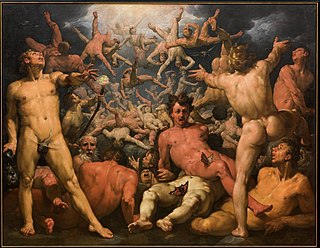
In Greek mythology, the Titanomachy was a ten-year series of battles fought in Ancient Thessaly, consisting of most of the Titans fighting against the Olympians and their allies. This event is also known as the War of the Titans, Battle of the Titans, Battle of the Gods, or just the Titan War. The war was fought to decide which generation of gods would have dominion over the universe; it ended in victory for the Olympian gods.
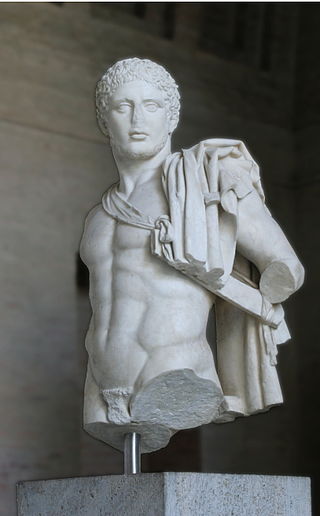
Diomedes or Diomede is a hero in Greek mythology, known for his participation in the Trojan War.
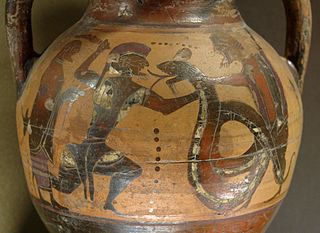
In ancient Greek religion and mythology, the twelve Olympians are the major deities of the Greek pantheon, commonly considered to be Zeus, Poseidon, Hera, Demeter, Aphrodite, Athena, Artemis, Apollo, Ares, Hephaestus, Hermes, and either Hestia or Dionysus. They were called Olympians because, according to tradition, they resided on Mount Olympus.

In ancient Greek religion and Greek mythology, Dione is an oracular goddess, a Titaness primarily known from Book V of Homer's Iliad, where she tends to the wounds suffered by her daughter Aphrodite. Dione is presented as either an Oceanid, daughter of Oceanus and Tethys, or the thirteenth Titan, daughter of Gaia and Uranus.
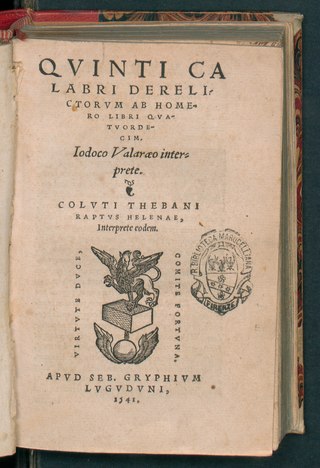
The Posthomerica is an epic poem in Greek hexameter verse by Quintus of Smyrna. Probably written in the 3rd century AD, it tells the story of the Trojan War, between the death of Hector and the fall of Ilium.
The Olympian Gods are characters based upon Classical mythology who appear primarily in Wonder Woman, Captain Marvel and Aquaman comics.

Hercules and Xena – The Animated Movie: The Battle for Mount Olympus is a 1998 American animated action-adventure direct-to-video film starring the voices of Kevin Sorbo, Lucy Lawless, Michael Hurst, Renee O'Connor, Kevin Smith, and Alexandra Tydings, all reprising their roles from the two live-action/special effects television series, Hercules: The Legendary Journeys and Xena: Warrior Princess. In the film, Zeus' wife Hera releases the four Titans after eons of imprisonment in a fit of jealousy, prompting Hercules and Xena to join forces and stop her. The film was produced and directed by Lynne Naylor and written by John Loy. It later received a television airing on Fox's Fox Kids block.
Athena is a fictional deity appearing in American comic books published by Marvel Comics. She is based on the Greek Goddess of the same name.

Hera is a fictional deity appearing in American comic books published by Marvel Comics. The character is based on the Greek Goddess of the same name. Hera first appeared in the pages of Thor #129, written by Stan Lee and drawn by Jack Kirby.
Mythic Warriors is a 1998-2000 anthology animated television series, which featured retellings of popular Greek myths that were altered so as to be appropriate for younger audiences, produced by Nelvana and Marathon Media. Two seasons of episodes were produced in February 8, 1998 and March 14, 1999; then aired as reruns until May 21, 2000, when CBS' abolition of its Nelvana-produced children's programming in favor of Nick Jr. and later, Nickelodeon content resulted in its cancellation. The series was based on the book series Myth Men Guardians of the Legend written in 1996 and 1997 by Laura Geringer and illustrated by Peter Bollinger.

The Iliad is one of two major ancient Greek epic poems attributed to Homer. It is one of the oldest extant works of literature still widely read by modern audiences. As with the Odyssey, the poem is divided into 24 books and contains 15,693 lines in its most widely accepted version, and was written in dactylic hexameter. Set towards the end of the Trojan War, a ten-year siege of the city of Troy by a coalition of Mycenaean Greek states, the poem depicts significant events in the siege's final weeks. In particular, it depicts a fierce quarrel between King Agamemnon and a celebrated warrior, Achilles. It is a central part of the Epic Cycle. The Iliad is often regarded as the first substantial piece of European literature.
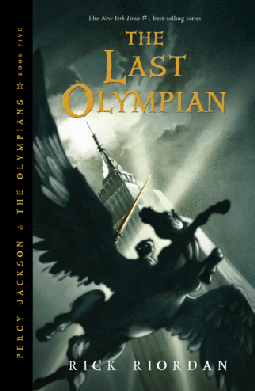
The Last Olympian is a fantasy-adventure novel based on Greek mythology by Rick Riordan, published on May 5, 2009. It is the fifth and final novel of the Percy Jackson & the Olympians series and serves as the direct sequel to The Battle of the Labyrinth. The Last Olympian revolves around the demigod Percy Jackson as he leads his friends in a last stand to protect Mount Olympus.

The Incredible Hercules was an ongoing comic book series written by Greg Pak and Fred Van Lente and published by Marvel Comics. The series starred the mythological superhero Hercules, his sidekick Amadeus Cho, the seventh-smartest person in the world, and half-sister Athena.

Zeus is a fictional deity in the DC Comics universe, an interpretation of Zeus from Greek mythology. His appearances are most significant in stories of Wonder Woman. With the 2011 relaunch of DC Comics dubbed The New 52, Zeus has received a prominent role in the Wonder Woman mythos, as he is now the biological father of Wonder Woman through Hippolyta.
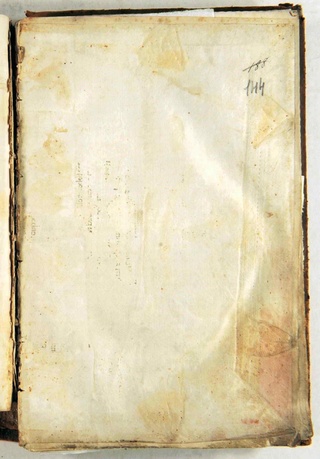
Dialogues of the Gods are 25 miniature dialogues mocking the Homeric conception of the Greek gods written in the Attic Greek dialect by the Greek author Lucian of Samosata. There are 25 dialogues in total. The work was translated into Latin c. 1518 by Livio Guidolotto, the apostolic assistant of Pope Leo X.